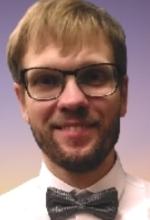Molecular biology (09 2023)
The purpose of the course is to provide in-depth knowledge of the structure of nucleic acids and nucleoprotein complexes, the peculiarities of genetic information flow (DNA replication) in prokaryotes and eukaryotes; to give an idea on gene expression at different levels (transcription, RNA processing, translation, post-translational modification of proteins), to familiarize with the mechanisms of gene expression regulation in prokaryotes and eukaryotes; to get acquainted with the molecular mechanisms involved in the adaptation of living organisms to the action of adverse environmental factors, in particular to the action of oxidative stress; to provide students with the theoretical basis of the main methods used by modern molecular biology to detect hereditary pathologies and infectious diseases, genome editing to correct hereditary disorders, and the generation of genetically modified organisms with beneficial properties for humans.
The main dogma of molecular biology. The flow of genetic information in pro- and eukaryotes and the basic principles of its regulation.
DNA replication — initiation, elongation, termination. Formation of phosphodiester bonds. DNA replication in E. coli. DNA replication in eukaryotes. Replication at the ends of linear chromosomes.
Terminology. Repair in E. coli by excision. Repair during replication. Reversal of damages. SOS repair.
Initiation and elongation. Termination. RNA polymerases of pro-, eukaryotes and archaebacteria. RNA processing. Ribozymes.
Activation of amino acids. Initiation, elongation and termination of protein biosynthesis. Regulation of translation.
Types of mutations. Chemical modification. Radiation damage. Errors of DNA polymerase and repair systems. Stretching the double helix. Biological mutagenesis. Directed mutagenesis.
General principles. Repression and induction. Operons and regulons. Peculiarities of gene expression in pro- and eukaryotes. Positive and negative control. Lactose and tryptophan operons. Catabolite repression. DNA protection.
Active forms oxygen in biological systems. Oxidative/reductive stress. Bacterial regulons OxyR and SoxRS. Yap1 stimulon in yeasts. The Keap1/Nrf2 system in animals.
Polymerase chain reaction. Detection of hereditary pathologies and infectious diseases by the PCR method. Genome editing to correct hereditary disorders. Genetically modified and transgenic organisms.







